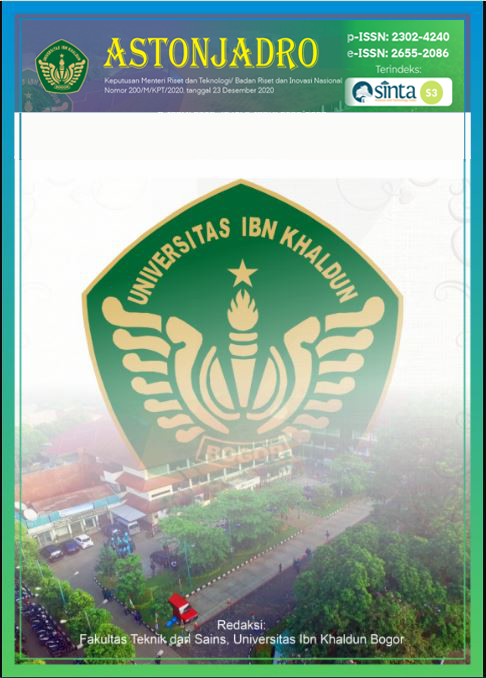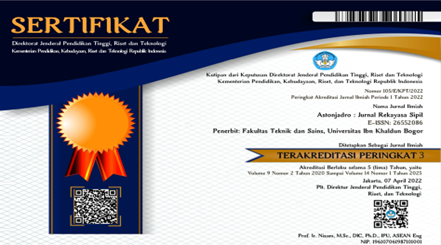Sustainable Development Strategy in the Bali Green School Area
DOI:
https://doi.org/10.32832/astonjadro.v12i2.8882Keywords:
strategy, sustainable development, green school Bali, GREENSHIP region, indicators.Abstract
Sustainable development is development to meet the needs of the present generation without compromising the ability of future generations to meet their needs in terms of environmental, economic and social aspects. Green School Bali, one of the educational areas in Bali that implements sustainable development. This study aims to determine the sustainable development strategy applied in the Bali Green School area. To assess whether an area is implementing sustainable development or not, an indicator is needed, which in this study uses GREENSHIP Regions. In this indicator there are seven categories and are grouped into sub-indicators which are further elaborated. This study will record whether these indicators are applied or not in reality through literature review, direct observation and interviews. So it can be concluded that the Bali Green School area implements a sustainable development strategy according to the GREENSHIP Area indicators.
References
Astoeti, D.R., Dwijendra,N.K.A. (2022). Green Supply Chain Performance Based on Green Building Assessment (Case Study of Sukawati Art Market Construction Stage, Gianyar Regency). ASTONJADRO: CEAESJ pISSN 2302-4240 eISSN 2655-2086 Volume 11, Issue 1, February 2022, pp.94-107
Green Building Council Indonesia.(2015). GREENSHIP NEIGHBORHOOD
Version 1.0.
Green School Bali. (2008). Diakses 11 Desember 2022. https://www.instagram.com/greenschoolbali/
Gunawan, I. (2015). Metode Penelitian Kualitatif. Bumi Aksara.
Hapsari , O. E. (2018). Analisis Penerapan Green Building Pada Bangunan Pendidikan (Studi Kasus : Green School Bali). AL-ARD: Jurnal Teknik Lingkungan Vol.3 No.2.
Harimurti, I.G.; dan Dwijendra, N.K.A.(2022). Kajian Penerapan Ekowisata di Kawasan Pariwisata Padangbai, Bali. Media Wisata, Volume 20, Nomor 1 EISSN 26858436
Kementrian ESDM. (2016). Jurnal Energi. Media Komunikasi Kementrian Energi dan Sumber Daya
Mineral. 30 Oktober 2022. https://www.esdm.go.id/assets/media/content/ FIX2_Jurnal_Energi_Edisi_2_17112016(1).pdf
Kindergarten Classroom at Green School / IBUKU. (2021). ArchDaily. Diakses 11 Desember 2022. https://www.archdaily.com/886235/kindergarten-classroom-at-green-school-ibuku ISSN 0719-8884
Macrory, Ben. 2013. Green School in Bali. Green Teacher Magazine No. 99
Mangunwijaya, Y.B. (1980) Fisika Bangunan, Gramedia Pustaka Utama, Jakarta.
Micro-Hydropower Systems. A Buyer's Guide. (2004). Natural Reources Canada. Government of
Canada.
Sugiyono. (2020). Metode Penelitian Kualitatif (S. Y. Suryandari (ed.); 3rd ed.). Alfabeta.
Sulistiawan, A. P., dkk. (2019). Identifikasi Material Berkelanjutan pada Ruang Luar dan Ruang Dalam Bangunan Kantor. Jurnal Arsitektur Zonasi Volume 2 - Nomor 3.
The Green School / IBUKU.(2010). ArchDaily. Diakses 11 Desember 2022. https://www.archdaily.com/81585/the-green-school-pt-bambu ISSN 0719-8884
The Millenium Bridge / IBUKU. (2019).ArchDaily. Diakses 11 Desember 2022. https://www.archdaily.com/884632/the-millenium-bridge-ibuku ISSN 0719-8884
Downloads
Published
How to Cite
Issue
Section
License
Copyright (c) 2023 ASTONJADRO

This work is licensed under a Creative Commons Attribution-ShareAlike 4.0 International License.
Paper submitted to ASTONJADRO is the sole property of the Astonjadro Journal. Unless the author withdraws the paper because he does not want to be published in this journal. The publication rights are in the journal Astonjadro.ASTONJADRO
LICENSE
This work is licensed under a Creative Commons Attribution-ShareAlike 4.0 International License.
Based on a work at http://ejournal.uika-bogor.ac.id/index.php/ASTONJADRO













